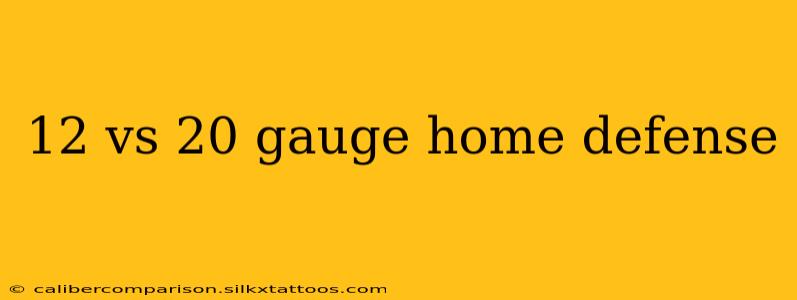Choosing the right firearm for home defense is a critical decision, demanding careful consideration of various factors. This article directly compares 12-gauge and 20-gauge shotguns, two popular choices for this purpose, helping you determine which caliber best suits your needs and abilities. We'll delve into the pros and cons of each, examining factors like recoil, stopping power, capacity, and overall practicality in a home defense scenario.
Recoil: A Significant Factor in Home Defense
One of the most immediate differences between a 12-gauge and a 20-gauge shotgun is recoil. The 12-gauge, with its larger shell and higher propellant charge, delivers significantly more recoil. While experienced shooters might find this manageable, newcomers or those with less upper body strength could struggle to control the weapon effectively, especially under stress. This lack of control can lead to inaccurate follow-up shots, a critical disadvantage in a home defense situation. The 20-gauge, on the other hand, offers a much more manageable recoil, allowing for quicker target acquisition and more accurate follow-up shots.
Recoil Management Techniques
Regardless of the gauge chosen, mastering recoil management techniques is crucial. Proper stance, grip, and follow-through are essential for controlling the weapon and maintaining accuracy. Consider practicing with reduced recoil ammunition to build confidence and proficiency.
Stopping Power: The Importance of Projectile Energy
Stopping power, the ability of a round to incapacitate a threat, is a key consideration. The 12-gauge, with its larger projectile, generally delivers higher energy and a wider spread of shot, leading to a greater potential for immediate incapacitation. However, overpenetration is a significant concern with 12-gauge, especially in densely populated areas. A 20-gauge, while having less stopping power than a 12-gauge, still offers sufficient energy for home defense, particularly with the use of buckshot or slugs. The reduced risk of overpenetration is a considerable advantage.
Ammunition Selection: A Crucial Element
Both 12-gauge and 20-gauge offer a variety of ammunition types, including buckshot, slugs, and birdshot. Buckshot is generally preferred for home defense due to its wider spread and increased stopping power compared to birdshot. Slugs, while offering greater range and penetration, present a higher risk of overpenetration and should be carefully considered. The choice of ammunition will significantly impact both recoil and stopping power.
Capacity: Rounds Available for Engagement
The capacity of the shotgun – the number of rounds it can hold – is another factor. Many 12-gauge shotguns offer higher capacity magazines compared to 20-gauge models. However, this advantage is often offset by the increased difficulty of managing recoil with multiple shots from a 12-gauge. A 20-gauge, with its reduced recoil, may allow for quicker follow-up shots even with a slightly lower capacity, ultimately negating the capacity advantage of the 12-gauge in a practical sense.
Practicality and Ease of Use: A Holistic Perspective
Beyond the technical specifications, consider the practicality and ease of use. The reduced recoil of a 20-gauge makes it easier to handle, especially for smaller individuals or those with less shooting experience. This enhanced control translates to faster target acquisition and more accurate shots under pressure, crucial elements in a home defense scenario. The lighter weight of a 20-gauge also makes it easier to maneuver and handle in tight spaces, a common characteristic of home environments.
Conclusion: The Best Choice Depends on Your Needs
The "best" gauge for home defense, 12 or 20, ultimately depends on the individual. The 12-gauge provides more stopping power but with increased recoil and overpenetration risk. The 20-gauge offers manageable recoil, reduced overpenetration concerns, and is generally easier to handle for various users. Consider your experience level, physical strength, living environment, and ammunition choices to make an informed decision. Always prioritize safe and responsible firearm handling practices. Training with your chosen weapon is absolutely critical before relying on it for home defense. Consider professional firearms training to hone your skills and ensure you’re prepared for any situation.

